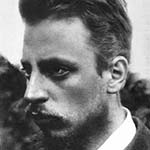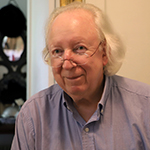Three Translations from Rainer Maria Rilke’s Uncollected Poems, July 2025
Forget, forget, and leave us with just
this now, experience the stars clearing through,
penetrating the night sky; like the moon the garden’s
fully transcended. We’ve been feeling for a long time
how it becomes more reflective in the dark, arising
like a gleam, a radiant white shadow
but now leave us alone,
we’re crossing over into a world
which is lunar—
Paris, early summer, 1909
O the curves of my longing through the universe,
and on every stroke: my being’s
outward flung. Some things not returning
before a thousand years on the swaying ellipse
of their momentum passing.
Rushing through the future that once was,
recognizing itself in the seasons
or airily, as a precise influence
almost starlike in the restless
apparatus trembling momentarily.
Venice, mid-July 1912
You from the start,
lost love, you, who never arrived,
I don’t know what sounds are precious to you.
No longer do I try, when the moment arises,
to recognize you. All the immense
images within me, landscape seen in the distance,
cities and towers and bridges and un-
suspected turn of events
and the mighty of those gods
who once traversed countries:
all rising to one meaning within me:
you, runaway.
Oh, you are the gardens,
oh, I saw them with such
desire. An open window
in the country house—and you almost stepped forward
towards me mystified. I found alleys,—
you had just walked them,
and the mirrors sometimes of the merchants’ shops
were still dizzy with you and, frightened, mimicked
my abrupt reflection.—Who knows whether the same
bird didn’t call through both of us
yesterday, separately, in the evening?
(Paris, winter 1913-14)
Translator’s Note:
I happened to find a copy of Edward Snow’s translation of Rilke, entitled The Poetry of Rilke, on the bottom shelf of a book stall at The New England Antique Mall, in Quechee, Vermont, a few years ago. Intuitively, I was drawn to it. It is a suitcase of a book, containing most of what Rilke wrote, excluding, perhaps, the French poems. As I mentioned to my spouse, Tevis, who encouraged me to buy it, I offered, “This just might be of use someday.”
I translated several dozen of these poems in the summer of 2024. I didn’t think I would translate anymore Rilke, until I picked up the Edgar Snow again, and began to read the ones I hadn’t translated, then decided to translate the ones that attracted me the most, since my versions were different than Snow’s. That sounds brazen but when an author’s voice enters into the translator’s blood and psyche it is impossible to put a stop to the hard work that follows: finding the balance between how you hear the author’s voice and how closely you can follow the author’s intent, the language that the author intended the reader for their understanding and what that understanding was meant to be.
The three poems I gathered for ANMLY were intuitively grouped by the trope of astronomy, of the stars. Each mention Rilke’s gravitation (pun intended) of heavenly bodies, how he rides that as a theme, how he allows the radiance of the heavens shine through him in undeniable Rilkean ways. We cross “over into a world/ which is lunar” in “Forget, forget,” written in 1909, and whenever I revisit the poem I actually feel myself brought along with Rilke into that eerie but sacred light.
In “O the curves on my longing,” the future as “apparatus” is mysteriously attractive to me. For it to become “a precise influence/ almost starlike” frames the unframeable, and for it to “tremble momentarily” references the human response when we think we believe we’ve just thought to see a star “trembling,” not unlike us when in the presence of divine splendor.
Perhaps “You, from the start,” nailed me from the beginning because I wrote a love poem two decades ago to Tevis regarding the sense of divinity I believe we shared in due to both of us hearing the same bird (in nature on a trail and at least in the poem), and was magnetized by the way Rilke uses reflection throughout the entire poem. We see mirrors and see the reflections of them. We look backwards in time and see forward to the present: Rilkean tautology at its alchemical best.

René Karl Wilhelm Johann Josef Maria Rilke (4 December 1875 – 29 December 1926), better known as Rainer Maria Rilke, was an Austrian poet and novelist. Rilke is appreciated as one of the most lyrical German-language poets. He wrote one novel in lyrical prose, The Notebooks of Malte Laurids Brigge (Die Aufzeichnungen des Malte Laurids Brigge), but mostly wrote verse, although he is also known for his several collections of his voluminous correspondence. Rilke’s work is often considered to be mystical, and his imagery often focuses on the challenge of being in communion with the ineffable—especially in what W. H. Auden termed “the age of anxiety.”

Wally Swist’s books include Aperture (Kelsay Books), poems regarding caregiving his spouse through Alzheimer’s, and If You’re the Dreamer, I’m the Dream: Selected Translations from Rilke’s Book of Hours (Finishing Line Press). Poems, essays, and translations appear in Chicago Quarterly Review, Commonweal, Healing Muse, Montreal Review, Poetry London, Rattle, and Your Impossible Voice. Wild Rose Bush: The Life of Mary and Other Poems by Rainer Maria Rilke was selected as an honorable mention in the 2025 Stephen Mitchell Prize for Excellence in Translation (Green Linden Press). Bainbridge Island Press will publish his newest collection of poetry, Discovering What to Say.

 BACK TO ISSUE
BACK TO ISSUE